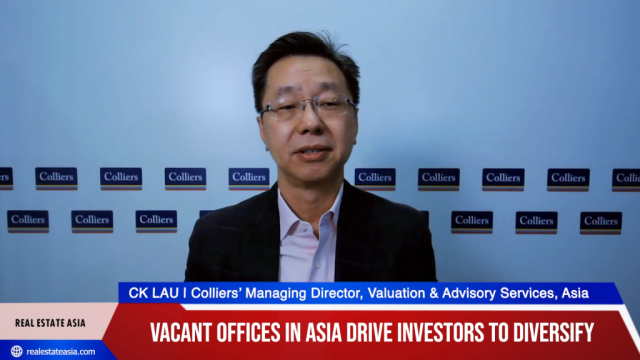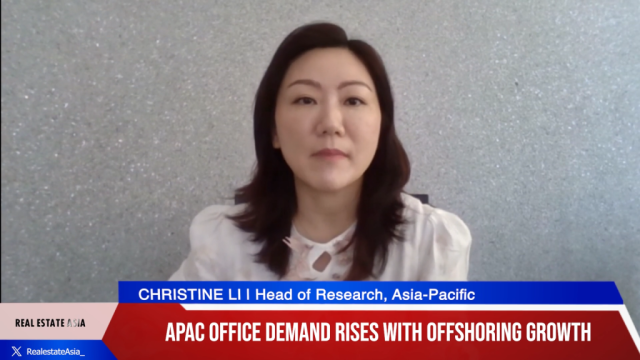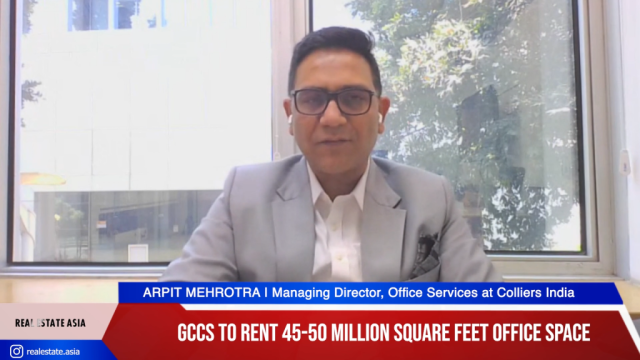
Why tech giants want their office space and what does this mean for the real estate industry
The tech industry accounted for 40% of the demand for office space, up from 20% in 2019.
Exclusive Interview with Cushman & Wakefield - The Decade of Asia Pacific from Charlton Media Group on Vimeo.
Anshul Jain, managing director for India and South East Asia of Cushman & Wakefield, spoke with Real Estate Asia Editor-in-Chief Tim Charlton and touched upon what this shift in the mix of clients mean for the industry, whilst discussing the latest trends and outlook for real estate in the region..
What real estate trends did you see over 2021 and what firsts did we have?
When we went into 2021, we thought that the industry is going to slow down, and decisions are not going to be made. But contrary to that, there were many firsts in 2021 in a decade.
Office rentals peaked at about $13 for the best and the most premium building in town right now. This was equal to the highest rent in 2019. But before that, the highest was in 2008. Office rental is clearly underpinned by the ability of the corporations or want of the corporations to move to the best-quality buildings. Flight-to-quality is a big trend.
If you look at industrial rent, it grew by 2% year-on-year. That was, again, a first since 2013. If you look at residential, the prices climbed up by 10.5%. That was a significant increase in price. And of course, the government's now putting down some cooling measures. But this price increased the highest since 2010. 33,000 units got sold roughly in 2021, which is the highest number of units that got sold in nine years. In terms of the residential sizes, what we've seen is the average size of the purchase going up since 2019. From 2015 to 2019, we saw the average size of the household going down. From 2019 to 2021, it's actually going up reflecting the fact that people want to perhaps spend more time in hybrid working and working from home. A lot of firsts I would say from the perspective of numbers, but it's just been a great year, which surprised all of us from a real estate market perspective.
What trends can we look forward to? We're seeing in Singapore, it's A team, B team set up. Is it really back to the office or is it hybrid?
I think A teams, B teams, etc. will really be governed by what the government tells us to do. So within that ambit, I think, the hybrid work is here to stay. We think that 60% working-from-office will be where we'll kind of settle down. Work from home is not a new global concept. In the US, European, and Australian markets, the three- to four-day working from office week was prevalent, and one- to two-day working from home was prevalent.
Now, what we'll see in the rest of Asia is a similar trend, where we think 60% of the time people will be working from the office. That trend is absolutely here to stay. But that does not necessarily mean that office demand will go down. On the contrary, office demands are actually going up. It's moving into better-quality buildings and the construct of the designers is changing how the offices are designed. It’s more collaborative, it’s more teamwork – offices are going to be used more as a social space, as opposed to, working as for a personal space.
The other big trends for 2022 that we're seeing clearly on the back of global sustainability push, the big [environment, social, and governance] ESG push. More and more corporations are going to demand better-quality buildings that are truly sustainable in nature. On the back of that, what we're going to see is perhaps investments starting to flow in on retrofitting some of the old buildings, which are going to get obsolete, and won't cater to the new ways of working or being sustainable enough. The other sectors such as data centres, industrial sectors in Singapore will perform exceptionally well. And I think, whilst the residential sector will cool down a bit, there'll still be enough in there for increase, enough demand going forward in the residential sector.
But one very interesting trend coming back to offices that we are seeing is a massive change in the mix of clients who've been asking for space. Pre-COVID, years 2018, 2019, what we were seeing was big demand coming in from the banking, finance, and insurance industry. Roughly 37% to 38% of the demand pre-COVID was coming from banking, and only 20% of demand is actually coming in from tech. And a good 20% of the demand was also coming in from managed workspaces, co-working spaces effectively. That's changed completely in 2021, where banking and finance have dropped a bit back to 30% from 37%. But the tech sector has clearly taken a big lead, from 20% up to 40%. Co-working has taken a bit of a backseat in 2021, but we think it will bounce back in 2022. What we have to watch out for is the tech sector—the co-working sector is going to bounce back and continuing demand coming in from banking and finance.
Just to give you an idea on the tech sector. Singapore, as you know, is a global hub for innovation, voted second-most innovative city by Bloomberg. Over 4,000 startups exist here and some of them will start growing bigger and the amount of money that's flowing in, and therefore that's going to have a demand on real estate. If you look at the top 12 tech companies, a mix of Chinese and American companies, almost 3,500 jobs are being advertised as of date. That's significant in terms of new expansion. So all in all, I see pretty healthy demand coming through for offices. All this employment and GDP growth will have a follow on effect on retail and industrial sectors being fueled by e-commerce and manufacturing. It just bodes well for the entire sector.
Is it just a lot of the big tech companies or are a lot of smaller startups coming out of America where they want an Asia Pacific office and they're going to have a 20- or 30-person office. Can you give us a sense of where they’re coming from?
It's really both right now. I think, if I look at 2021, most of that demand actually came from big companies, whether they’re big Chinese companies or big American companies. But we think that going forward, 2022 onwards, you'll probably see startups kind of bouncing back. Now what happened when the pandemic hit – real estate was the easiest thing to cut back. Start ups are generally tight on money, and therefore they cut back on office space pretty quick but as the economy bounces back, I feel the smaller and mid size companies are going to gravitate back to office space and therefore the demand from startups is just going to come back, in particular, for furnished offices and coworking spaces again. So if I look forward to two or three years, we expect pretty heavy demand coming up from small and mid size start ups with some potentially becoming unicorn and a large space absorber in the next few years.
Are there any anecdotes that you can share with us about recent transactions or leasing deals or sales that you think people should be paying attention to?
2021 was an interesting year, you know, we had almost $25b-worth invested in real estate in Singapore, five of which roughly was office, but the interesting part was almost four-and-a-half actually came in industrial. Industrial is usually a lot lower than offices. The big buildings sold from an office perspective included, the PIL Building, [and] 112 Robinson amongst a few others. The deals however took longer because debt financing took more time. People were cautious in 2021. But I think the market really supported the sale of the building, and there's lots of capital right now. We think that going forward in 2022 and beyond, we'll see a lot more of that. We expect the market to be really active.
What initiatives is your organisation working on at the moment?
We recognise the status of Singapore as a regional powerhouse, as a regional headquarter city for most of the multinationals. So for us, Singapore has two meanings: one is Singapore for Singapore, and the other is Singapore for Asia. What we've done so far is we've strengthened Singapore for Singapore very significantly. The next steps that we're working on is to strengthen Singapore for Asia. We are also investing significantly in building local and regional teams, and building two brand new offices. A very exciting move is coming up for us, moving into CapitaSpring, one of the topmost floors. Building that signifies innovation signifies sustainability, and signifies leadership, which is the positioning we have in Asia.
As you look around that region, which markets are hotter, and which are cooler, if you can grade them like that?
India is super hot at the moment. Apart from the sort of couple of months of COVID issues last year, which was pretty horrible, it's kind of managed the whole COVID sentiments quite well. The markets open and they’re exceptionally hot. Broadly, the industrial markets across Asia are pretty hot. We see a lot of activity in Japan. China continues to be a powerhouse for us. Australia was largely shut last year, but we do expect things to start opening up in Australia. We expect Australia to start bouncing back in 2022.
Amongst the smaller countries, we're very excited about Vietnam, which is benefiting from the China-Plus-One strategy. The Philippines will continue to be a large outsourced market from the US. It will rely principally on the US multinationals and their expansion. I think the local economy in the Philippines is still going to chug along and probably take a while.
I think highly regulated markets in other Southeast Asian countries are a little bit of an issue. I think Indonesia, of course, has all the right metrics, large population, young population, and decent GDP growth. But it’s still a highly regulated market, we still have pretty good business there. I think that the market for us is bigger and better. Thailand is clearly a hospitality-driven market.























 Advertise
Advertise







